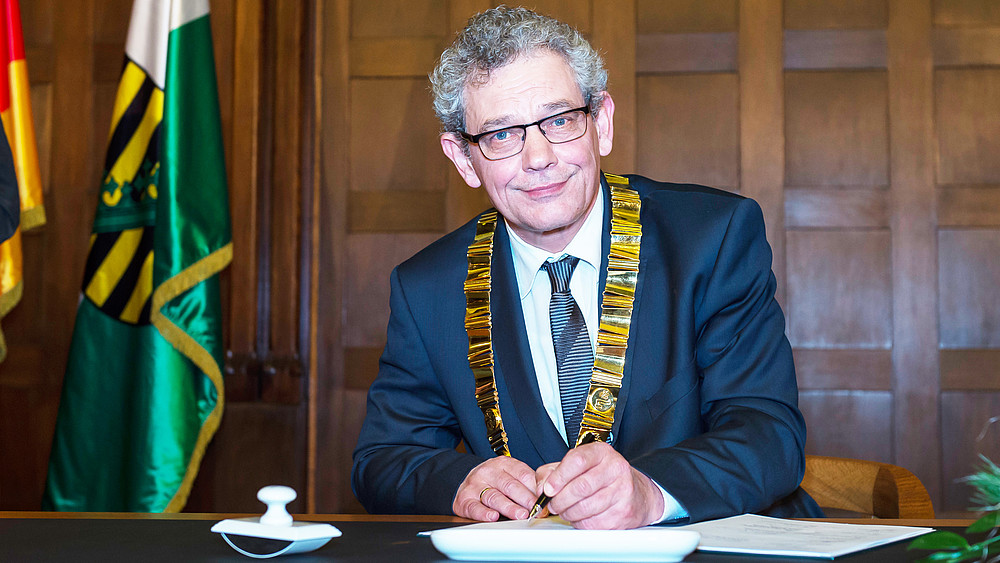Free State of Saxony signs grant agreement with the 14 state universities for approx. 6.5 billion euros.

With the signing of the grant agreement between the state government and universities on December 19, 2016, a sustainable foundation and an exceptionally long-term funding framework for the 14 Saxon universities will be created until the end of 2024.
The current grant agreement not only provides financial planning security for the universities over the next eight years, but also increases their resources and scope for action with a total volume of around 6.5 billion euros. The previous grant agreement was signed in December 2013 with a term of three years until the end of 2016. The degree of the 2017 - 2024 grant agreement fulfills a key agreement of the coalition agreement.
Among other things, the agreement ensures the funding of 9034 staff positions at universities. It was also agreed to forego the planned reduction of 754 positions from 2017 onwards. The funds that have been freed up due to the federal government taking over BAföG funding for students will continue to be used in full for the higher education sector, as will the federal government's Higher Education Pact 2020 funds. In addition, the Free State of Saxony will provide the state's share of the Excellence Initiative. Further investment grants per year are also possible for universities, depending on budget developments
Minister President Stanislaw Tillich considers the agreement to be a very good result.
"The state government remains a solid partner to the universities. With this agreement, we are creating the conditions for our universities and colleges to continue to be successful in national and international competition. This also applies to the continuation of the Excellence Initiative. Strong, vibrant and innovative universities are a benefit for us all. After all, they are not only employers and important centers for training skilled workers. They are also drivers of innovation and bring together bright minds from all over the world. That's good for Saxony, we need that."
With a view to the long term, he added:
"More reliability is hardly possible."
Science Minister Dr. Eva-Maria Stange is satisfied:
"This grant agreement provides the solid financial foundation on which the universities can continue to develop over the next eight years and profile themselves according to their strengths. We are securing comprehensive study programs as well as small subjects and raising the profile of research in particular. We are experiencing a paradigm shift away from reducing capacities towards long-term planning security at a solid financial level. We are not only securing the status quo, but also guaranteeing a two percent increase until 2024. This ensures a good student-faculty ratio. The quality of teaching, research and knowledge transfer can be further improved. The universities will assume their responsibility for society as a whole and for their region. Excellence will be strengthened. No institution in Saxony can reliably plan and develop over such a long period of time. I am very happy about that."
Finance Minister Prof. Georg Unland explains:
"With the grant agreement, the Free State of Saxony guarantees financial and personnel planning security for the state universities over eight years. This is a great privilege compared to other authorities and institutions of the Free State, which do not have such long-term planning security. This agreement underlines the enormous importance of education and research for the state government. The universities receive a high level of trust, but also a high level of responsibility to take advantage of the opportunities arising from this grant agreement and to achieve the strategic goals of the Saxon University Development Plan 2025."
Prof. Dr. Hans Müller-Steinhagen, Chairman of the State Rectors' Conference and Rector of TU Dresden emphasizes:
"The grant agreement signed today between the Free State of Saxony and the Saxon universities creates planning security for the universities in terms of financial resources and positions for the next eight years, which is unique in Germany for this duration. In addition, the job cuts originally decided by the Saxon state parliament in 2010 have been reversed. For the TUD, this means that around 250 jobs will be retained and that planning without job cuts has finally been possible for the first time in a long time! We are grateful to the state government for this, as it would otherwise have been impossible for the TUD to continue its positive development and submit promising concepts in the next round of the Excellence Initiative."
The grant agreement also enshrines the universities' performance obligations and forms the financial basis for the individual target agreements concluded between the Saxon Ministry of Science and the Arts and the individual universities. Among other things, the universities undertake to achieve the state targets for new students and student numbers, to exploit joint performance and resource potential and to further optimize their administrative activities.
Download PDF: Grant agreement 2017 to 2024
Published by: Saxon State Government